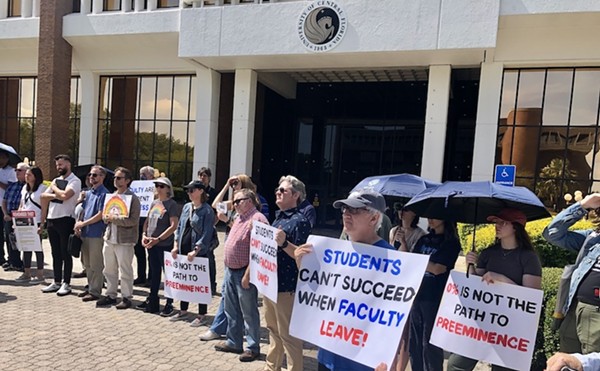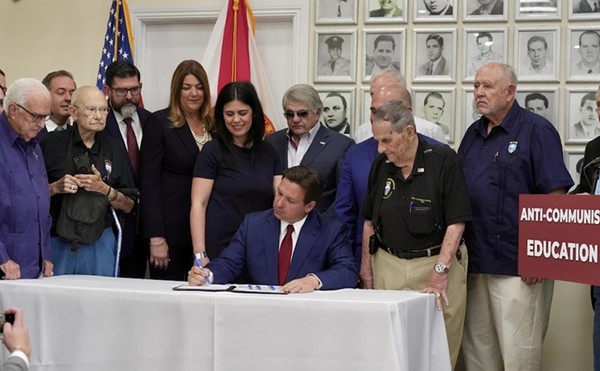Last week, Ray Milton Krone -- pegged for the 1991 stabbing death of a Phoenix waitress -- was finally let off death row. New DNA evidence proved that Krone had not committed the crime. After three years on death row and 10 years in prison, he became the 100th innocent death-row inmate to be exonerated since 1973.
Compared to many others, Krone was lucky he survived long enough to prove his innocence. While Krone waited out the appeals process, more than 600 death-row prisoners were put to death in the United States. He might owe his life to the arbitrary fact that Arizona doesn't kill its death-row inmates at the breakneck pace of, say, Texas.
While many Americans still support the death penalty in principle, they also worry about innocent people paying the ultimate price for crimes they didn't commit. A CNN/USA Today/Gallup poll conducted in 2000 found that 80 percent of Americans believe an innocent person has been executed in the United States in the past five years. It is impossible to know if they're right, but with 100 innocents released in the last 29 years, it seems quite likely.
With this rate of execution, more world leaders have voiced mounting concerns about the finality of capital punishment. UN Secretary General, Kofi Annan, articulated his ambivalence when accepting the "Moratorium 2000" petition for a stop to executions worldwide. "The forfeiture of life is too absolute, too irreversible, for one human being to inflict it on another, even when backed by legal process," Annan said. "And I believe that future generations throughout the world will come to agree."
A closer look at a few of the 100 innocent people who have been released from death row gives sobering weight to Annan's statement:
- The former prosecutor for Delbert Tibbs, whose conviction was overturned in Florida, said that the original investigation was tainted from the beginning. If there were ever a retrial, the prosecutor said, he would gladly appear as a witness for Tibbs.
- Also in Florida, Joseph Green Brown waited 13 years to be exonerated and came within 13 hours of execution before a new trial was ordered. Brown walked out -- a free man -- a year later when the state decided not to retry the case.
- Charles Ray Giddens, an 18-year-old black man in Oklahoma, was sentenced to death for the murder of a grocery store cashier after an all white jury deliberated for only 15 minutes. Three years later, the state dropped all the charges.
- Anthony Porter of Illinois was one of the lucky death-row defendants taken on by Professor David Protess and a handful of journalism students from Northwestern University. Porter came within two days of execution in 1998 and was only granted a stay because the court wanted to examine his mental competency. Porter had an IQ of 51. One year later, his conviction was overturned.
- Timothy Hennis spent three years incarcerated in North Carolina because he resembled the actual murderer.
- Peter Limone of Massachusetts was sentenced to the electric chair in 1968. Although Massachusetts abolished the death penalty in 1974, Limone spent an unimaginable 33 years behind bars before he was proven innocent of the charges against him.
These, of course, are the stories of the fortunate ones, saved by the efforts of pro-bono lawyers, new evidence or the built-in checks and balances of the justice system. Untold numbers of inmates don't get those breaks.
Upon Krone's release, Sen. Patrick Leahy (D-Vermont) reflected on the unavoidable margin of error in capital cases. "There should be no shame in errors made by well-meaning jurors, because human error is inevitable. But what is deeply shameful is a political and legal establishment that lives in denial. What shocks me most about this case is not that yet another innocent man's life was ruined; it is that the prosecutor then called the system that did this Ã?the best in the world.'"
Along with Sen. Gordon Smith (R-Oregon), Leahy is leading the effort to pass the Innocence Protection Act, a bill that would provide new safeguards in capital cases, including DNA testing and highly competent lawyers.
Lawmakers aren't alone in questioning the system. According to the Washington Times, on April 25 U.S. District Court Judge Jed S. Rakoff gave the Justice Department "one last opportunity" to show him why he shouldn't declare the federal death-penalty unconstitutional. The department -- which is increasingly aggressive pushing the federal death penalty -- has until May 15 to answer the judge's belief that the system kills innocents. Death violates due process, he said, by thwarting what should be a defendant's endless process of proving his or her innocence. It also denies them of the opportunity to use not-yet-invented technology in their defense, like DNA is used now.
If Rakoff rules against the government and appellate courts concur, the ruling would affect not only the 24 people on federal death row but the 3,687 inmates awaiting death in state prisons.
Illinois's Republican governor, George Ryan, has already appointed a commission to study capital punishment in his state. Ryan's commission, which issued its report this week, "proposes a menu of reforms, among them videotaping interrogations to prevent dubious confessions, expanded use of DNA testing and diminishing reliance on single-witness or stool-pigeon accounts." Commission members also acknowledged that the only way to be sure innocents weren't killed was to junk capital punishment altogether, though such a recommendation was outside their official purview.
Most politicians want to impress their constituents as being tough on crime, so popularity often gets in the way of mercy -- especially around election time. But the more death-row inmates are found innocent, the more likely it is that elected officials will reconsider.
Said retired Judge James McDougall, who presided over Krone's 1996 re-trial. "I'm still very shaken about the whole thing. I keep going over it in my mind, and it still bothers me ... It's not easy to tell a jury you think they're wrong."



















